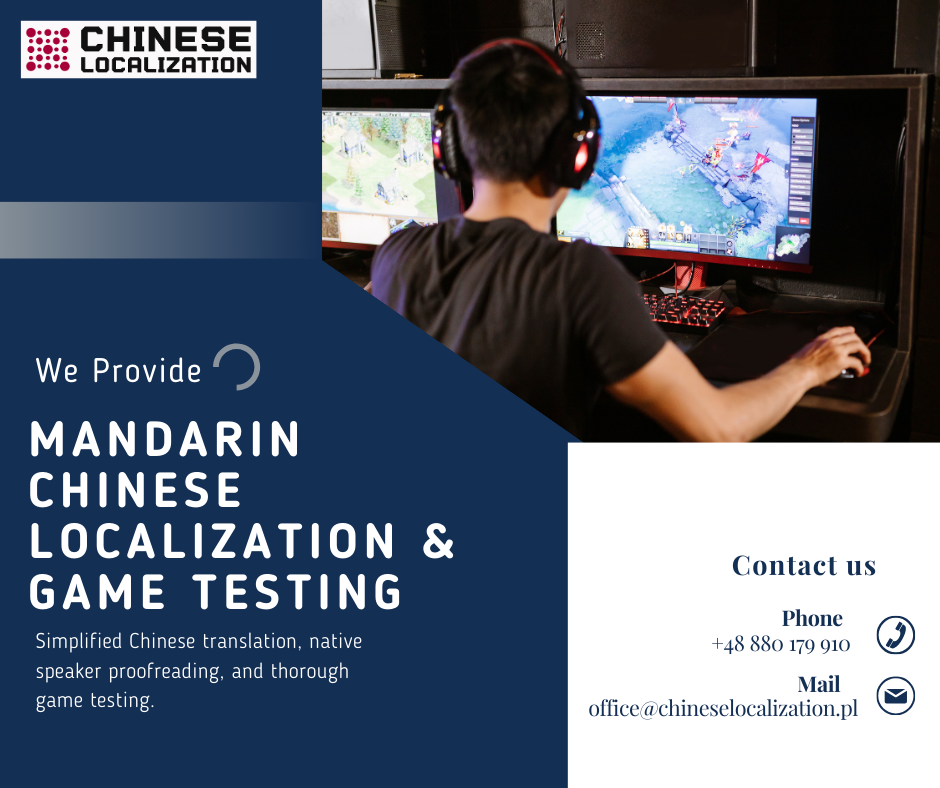The ABCs of Game Translation: What You Need to Know
One of the aspects we enjoy most about localizing video games is the variety of topics and texts that we encounter. Each project transports us to entirely new realms, unlocking the doors to captivating fields. A game translator's task involves not just language skills but, above all, the ability to immerse in the atmosphere of a particular game and convey this ambiance to the player.
The goal is to craft a translation that makes players feel as if the game were originally created in their native language. Players are a demanding group that pays attention to the smallest details, and Chinese players, being even more critical, pose a challenge to Chinese translators on various levels.
It's crucial not only to master the language perfectly but also to possess a profound understanding of the environment and the industry. This combination of linguistic skills and the insight into the specifics of video games allows us to create translations that capture the content and take the Chinese player into the world of a game, making the experience authentic and unforgettable.
Challenges typically faced by video game translators
- Large volume of text
In the world of game localization, where the amount of content may be huge, discipline and precise work planning play a crucial role in meeting the necessary deadlines. Fortunately, modern CAT tools and process automation enable translation at a much faster pace and on a larger scale than ever before. Nevertheless, despite these modern conveniences, game translation is still a time-consuming and complex process, requiring full commitment and insight to guarantee the highest quality.
- Tight deadlines
The localization process, though crucial, is just one of many stages in game production. Often, the content of the story takes its final shape only right before the game’s release date. This means that such a large amount of work must be done in a very short time.
- A small mistake might have big consequences
Proper translation of proper names, inventory elements, dialogues, settings or commands is something that significantly affects the quality of the game. An underdeveloped translation can discourage from the game or even prevent it from continuing. An incorrectly translated single sentence or word positioned in a prominent space might catch the attention of every player.
- Translation may require proficiency in specialized vocabulary
Each game is set in a different theme and requires an individual approach. The translator must always thoroughly familiarize themselves with the field covered by the game or with the story behind it. For example, in the case of a game related to horse breeding, enthusiasts of this specific hobby, such as horse breeding enthusiasts, will certainly notice any inaccuracy in the vocabulary used, especially when it comes to the specificity of their equestrian nomenclature. In such cases, searching for equivalents of specific words in Chinese would necessitate additional research on the Chinese Internet and familiarization with the nuances of Chinese horse culture. Examples like these can be multiplied because the vocabulary used in some games may be very technical and specialized.
Game localization in Chinese
Additional difficulties that Chinese language poses to game translators:
- Cultural differences
Chinese communication and expression differ from other cultures. They use specific metaphors so many jokes, including black humor or allusions to Western pop culture, can cause confusion in the Chinese. When translating into Chinese, it is necessary to partially transform, that is, to create a new version of a given issue that retains the overall meaning of the original, but is not its ideal counterpart. It is a procedure that helps to adapt the game to local recipients, because the goal of the translation is their pleasure from playing.
- Context
In the case of the Chinese language, the context in which the sentence appears has a special meaning, affecting what specific words the translator should use. It happens that English and Chinese words that seem to be the ideal counterparts in both languages in a given context, however, do not fit together, which comes to light only during language tests. Difficulties also arise when translating seemingly simple but general commands or sentences, which in Chinese must be formulated more precisely or more descriptively in order to be understood by the speakers of the language.
- Displaying Chinese characters
Chinese characters, while beautiful and fascinating for their long history, can be a challenge for European developers and game producers. Sometimes, a font created for an European language is not suitable for the display of all Chinese characters, and some of them look like squares. This is an issue that certainly needs to be paid attention to in the process of preparing the game to enter the Chinese market.
What should I be aware of when ordering the localization of my game into Chinese?
- A native speaker of the language must be involved in the project. This is a prerequisite for the game to be positively received in China. Naturally sounding dialogues, clear messages and straightforward tutorials are crucial in the game, because players are supposed to enjoy it it without pondering over what a phrase was supposed to mean. Improperly translated commands could even prevent you from completing the game. The Chinese translator will also stay up-to-date with the trends prevailing on the Chinese Internet and will be able to enrich the text with slang or jokes that have a natural sense. Of course, they must be a trustworthy person experienced in gaming translations.
- Translating only the text itself is not always sufficient. Even a very high-quality translation of the text into Chinese, even after proofreading, may not hold up throughout the entire game. The context in which individual sentences and phrases are displayed is extremely important. Chinese testing of the game is, therefore, a natural and important stage of the LQA process, as it helps to catch language bugs."
